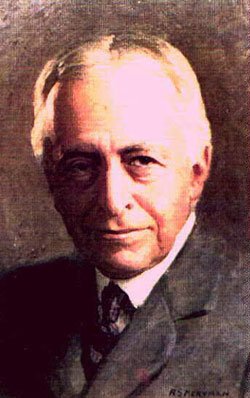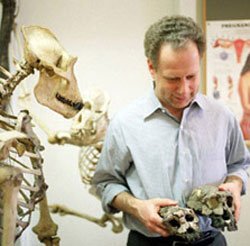Category Archive 'Scientism'
01 Nov 2019


A view of my hometown, Shenandoah, Pennsylvania, from the southwest, in the vicinity of the West Shenandoah Colliery, overlooking the culm banks, circa 1910. The writing says in Lithuanian: “Ar ne grazios apylenkis?” (sarcastically) “Are not the surroundings beautiful?” The location of the Lithuanian church is also marked by hand.
The Economist quotes a British DNA study contending that it wasn’t brains or character or superior family culture that caused the lucky ones who got out to leave. No, it was deterministic genes.
To establish baselines for their work, Dr Abdellaoui, Dr Visscher and their colleagues turned first to 33 published studies that used a technique called genome-wide association study. This is intended to discern the contributions to a trait of large numbers of genetic differences that each have a small effect. It concentrates on so-called single-nucleotide polymorphisms (SNPs)—places in the DNA where an individual genetic “letter†routinely varies from person to person. There are, for example, about 100,000 SNPs that affect height. On average, each makes a contribution, either positive or negative, of 0.14mm to someone’s adult stature. This is in contrast to Mendelian variations, where a single difference between individuals has a pronounced effect—such as the difference between brown and blue eyes.
Each of the 33 baseline studies identified large numbers of SNPs that had positive or negative effects on a particular trait: extroversion, heart disease, height, body fat, age at menopause, recreational drug use and so on. The researchers then applied these SNP patterns to the records of 450,000 UK Biobank participants, and asked various questions. One thing they looked for was geographical clustering of SNPS related to individual traits. This, they discovered in abundance. Of the 33 traits under consideration, 21 showed evidence of SNP-related geographical clustering.
The most strongly clustered of all, they found were SNPS for educational attainment (ie, how many years an individual had spent at school and college). SNPs lowering educational attainment were particularly clustered in former coal-mining areas. These are places that have seen a lot of internal migration, both inward, when the mines were developed during the late 18th and 19th centuries, and outward, after the second world war, as mining shrank from being one of Britain’s biggest employers to its current state of near non-existence.
Dr Abdellaoui and Dr Visscher were able, from their studies of the biobank’s records, to chart the effects of the more recent, outward migration. They divided participants into four groups: those born in mining areas who had subsequently left; those born in mining areas who had stayed; those born outside mining areas who had moved into one; and those who had never lived in a mining area. The results were stark. People in the first group, outward migrants from mining areas, had significantly more educational-attainment-promoting SNPS, and fewer damaging ones, than any of the other groups, while people in the second group, stay-at-homes in mining areas, had the opposite.
Though not quite so sharply as with educational achievement, this pattern was also reflected in all but one of the other 20 SNP-related traits the researchers looked at. With the exception of bipolar disorder, the best outcomes were found in outward migrants from coalfields and the worst in stay-at-homes. The healthy, in other words, depart. The less healthy remain.
The upshot is a vicious spiral. That young, ambitious, healthy people tend to leave economically deprived areas is hardly news. But to see that written clearly in their DNA, which they take with them when they leave, while the converse is written in the DNA of those who stay behind, raises questions of nature and nurture that society is ill-equipped to answer, and possibly unwilling to confront.
RTWT
23 Jul 2018


Irving Babbitt, 1865-1933.
Amanda Reichenbach, a recent graduate of Yale, has an excellent essay in National Review on the now-almost-forgotten humanist Irving Babbitt’s critique of Modernism.
Babbitt reacted against what he regarded as the twin evils of the modern era: Romanticism and utilitarian scientism. … Babbitt did not see them as opposed forces. Rather, they worked in concert to reduce humans — complex, multi-dimensional beings — to cardboard cutouts incapable of moral choice.
Babbitt’s fundamental view of the human condition was that the “higher will†waged a lifelong, internal “civil war in the cave†against the “lower will.†Modernity, he believed, tended to collapse the distinction between the two wills. That “man is naturally good and that it is by our institutions alone that men become wicked†is, he thought, the most dangerous belief, found in Rousseau’s Confessions. It replaces the true dualism of the “civil war in the cave†with dualism between man and society.
This individual who sees liberty in the ability to follow every whim — someone whom Deneen would call a liberal, and Babbitt a Romantic — is drawn to a sentimental libertinism in which indulgent emotion is elevated over the hard work of becoming a good person. The Romantic wishes to see destroyed any laws and customs that might prevent him from doing all that his heart desires.
When human passions are released, however, writes Babbitt, “what emerges in the real world is not the mythical will to brotherhood, but the ego and its fundamental will to power.†The will to power often presents itself in palatable ways, replacing traditional notions of virtue with what Babbitt calls “a sort of parody of Christian charity.†The Romantic is drawn not to humanism but to emotional humanitarianism. Believing himself to be blameless, the Romantic locates the source of society’s evils in everybody else. The Romantic humanitarian, Babbitt argues, will always go around pointing out the specks in his neighbors’ eyes while a plank burdens his own. Rousseau, the chief example of this tendency, wrote a 500-page book on how to raise and educate children, after leaving five of his own to a foundling hospital.
The Romantic soon discovers that a lack of restraint is a sure recipe for loneliness, though he has been promised emotional communion with his fellow beautiful souls. When he finds that his philosophy is based on Arcadian unreality, his disillusion leads him to “drift towards a naturalistic fatalism.†Babbitt argues that the rise of science and sociology teaches man that he is entirely a product of his circumstances and incapable of individual moral improvement. Here, too, the lines are not drawn between what is good and what is bad within each human, but between the individual and the society that conditions him. Given the twin influences of Romanticism and scientism, Babbitt feared, “man is in danger of being deprived of every last scrap and vestige of his humanity,†since he “becomes human only in so far as he exercises moral choice.â€
A must-read.
18 Mar 2016


Betty Gorisch discusses the exaggerated sense of self-importance which so wildly misunderstands the comparative scale and importance of humanity and its activities in the great scheme of things. There is consequently always an imminent danger of our producing one or another species of grand natural catastrophe if we fail to listen to our experts.
[H]umans tend to see themselves as the causes of a great many natural-world disruptions, which allows applications of political pressures imposing behavioral control on humanity. I suggest we may be looking at a kind of infantile egoism extending into individual and collective maturity and throughout our species; human agency as causative should accordingly be looked upon with skepticism. The view seems to be that if it were not for human activity, the natural world would not change much, and certainly not much for the worse. When challenged with specifics on such matters, most people would be quick to acknowledge that there are indeed other engines of destruction, but there is a default tendency to blame people and the things they make and do first. Any other possible causes are generally evaluated later — not only after human agency has been ruled out, but also after media attention on the matter in question has faded.
Some few of these people almost certainly know better. We can only speculate about their motives. I myself find it almost incomprehensible that they think their own accumulation and exercise of power will be unimpeded by reality. In similar fashion, it is difficult believe that they can be motivated by the gaining of wealth. They already have wealth in nearly monopoly quantities, and while it is clear that they are not merely interested in living extravagantly and intend, instead, to purchase more power, they have not many serious opponents in this world for that either. They come perilously close to being whisperers — the kinds of faint seductive whisperers who inspire humanity with, “You will be like God!â€
Read the whole thing.
28 Sep 2012


“Thank God! A panel of experts.”
Wesley J. Smith identifies the liberal dream: Utopia achieved by the power of the administrative state wielded by scientific experts.
Liberals, what do they really want? Not the communism or socialism of the right’s fever dreams. They know that didn’t work. Today’s liberal agenda is more akin to the corporatist vision of the 1920s and ’30s​—​an economy in which the state directs the activities of the private sector to achieve ideologically desired ends. But even that description doesn’t quite get to the nub of it. Liberals today seek to create a stable, and what they perceive to be a socially just, society via rule by experts​—​in which most of the activities of society are micromanaged by technocrats for the economic and social benefit of the whole. In other words, social democracy without the messiness of democracy, like the European Union’s rule-by-bureaucrats-in-Brussels. This is the “fundamental transformation†that President Obama seeks to implement in this country.
Read the whole thing.
When you come right down to it, all this is so early last century. The liberal is the intellectual who learned essentially nothing from the last century. Barack Obama might just as well be William Jennings Bryan in blackface.
16 Jun 2012


Daniel E. Lieberman, Professor of Human Evolutionary Biology, Harvard University
It was not for nothing that the late William F. Buckley, Jr. declared: “I would rather be governed by the first two thousand people in the Boston telephone directory than by the two thousand people on the faculty of Harvard University.”
Daniel E. Lieberman, a Harvard-educated Anthropologist who has managed to segue smoothly from his native social science to teaching Evolutionary Biology, won recent top marks in Scientism, the inappropriate and hubristic application of scientific theories to political and moral issues, when in a New York Time’s editorial last week, he informed readers that Evolution was voting in favor of Mayor Bloomberg’s soft drink ban specifically and government coercion in general.
Lessons from evolutionary biology support the mayor’s plan: when it comes to limiting sugar in our food, some kinds of coercive action are not only necessary but also consistent with how we used to live. …
Since sugar is a basic form of energy in food, a sweet tooth was adaptive in ancient times, when food was limited. However, excessive sugar in the bloodstream is toxic, so our bodies also evolved to rapidly convert digested sugar in the bloodstream into fat. Our hunter-gatherer ancestors needed plenty of fat — more than other primates — to be active during periods of food scarcity and still pay for large, expensive brains and costly reproductive strategies (hunter-gatherer mothers could pump out babies twice as fast as their chimpanzee cousins).
Simply put, humans evolved to crave sugar, store it and then use it. For millions of years, our cravings and digestive systems were exquisitely balanced because sugar was rare. Apart from honey, most of the foods our hunter-gatherer ancestors ate were no sweeter than a carrot. The invention of farming made starchy foods more abundant, but it wasn’t until very recently that technology made pure sugar bountiful.
The food industry has made a fortune because we retain Stone Age bodies that crave sugar but live in a Space Age world in which sugar is cheap and plentiful. …
We humans did not evolve to eat healthily and go to the gym; until recently, we didn’t have to make such choices. But we did evolve to cooperate to help one another survive and thrive. Circumstances have changed, but we still need one another’s help as much as we ever did. For this reason, we need government on our side, not on the side of those who wish to make money by stoking our cravings and profiting from them. [Emphasis added] We have evolved to need coercion.
Professor Lieberman neglects to explain how Evolution effectively draws the line between acceptable, desirable, and morally justifiable forms of state coercion, including taxes, regulations, and special paternalistic supervision of children, and even more effective and draconian measures, for instance, the Khmer Rouge marching the overweight urban inhabitants of Cambodia back into the country at machine gun point, aimed at “restoring a natural part of our environment. ”
He doesn’t offer any general principled account of why Evolution supports this and doesn’t support that precisely because he hasn’t got one. Professor Lieberman simply assumes that Evolution and Science (and Progress and the God of History) is embodied in the world by the consensus of people like himself, by the current opinions of the educated elite community of fashion.
One can find the scientific way of deciding things simply by reading the editorial pages of the Times.
All this, of course, is rubbish. The opinions and theories of Evolutionary Biology (let alone Anthropology) are anything but set in stone. Someone may discover next week the intense Neolithic cultivation of sugar beets in the Fertile Crescent. Medicine may decide that obesity is really caused by a particular gene, and that the specifics of diet play only a small role.
In the 1950s, Evolution would have decreed that you must drink milk to cure ulcers produced by the unnatural stress of modern capitalist life. Our latest information contends that bacteria are to blame and milk-drinking doesn’t do a thing.
More importantly, though, mere scientific facts are incapable of addressing philosophical questions of individual rights and the proper role and limits of the powers of government. Those issues have nothing to do with imaginary dietary teleologies and have to be debated on an entirely different level.
Scientism, the presumptuous attempt to misapply scientific theories or data in contexts in which they cannot possibly be determinative, is actually, I would argue, decisive evidence of bad education and intellectual incompetence.
It has been recognized for many decades now, certainly back to the 1960s or 1970s when Bill Buckley offered his famous apothegm concerning the faculty of Harvard, that there exists a tremendous and thoroughly alarming disconnect between our establishment intelligentsia and wisdom and common sense. Professor Lieberman is simply the most recent in a long series of wise fools.
/div>

Feeds
|








